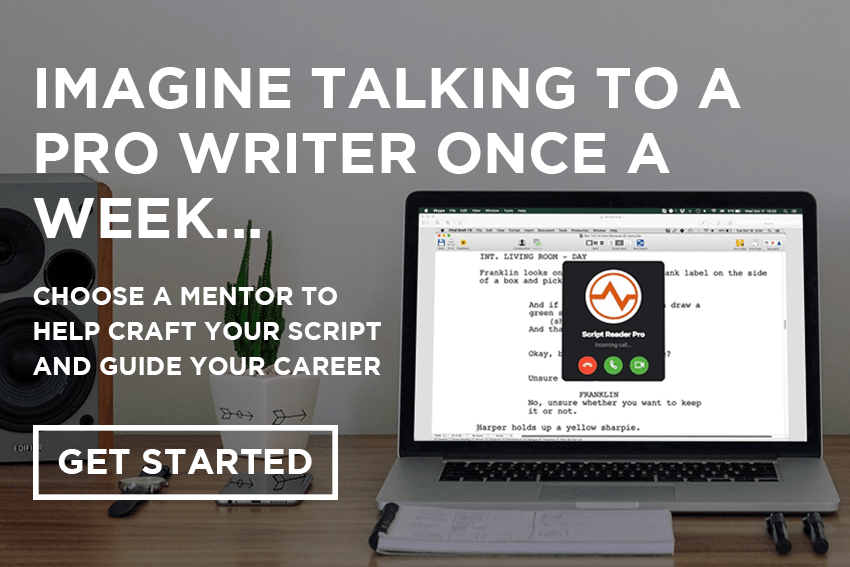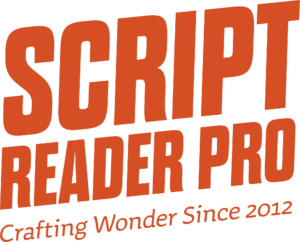On the nose dialogue examples and how to stop it killing your script.
What's the quickest way of letting someone reading your script know they're in the hands of a novice? Answer: Write on the nose dialogue.
On the nose dialogue is like Kryptonite to the reader and should be eliminated wherever it's found.
In this post we're going to tackle how to write a dialogue between two characters that feels as natural as possible. We'll do this by using examples of on the nose dialogue, followed by what the writer could have written instead.
So let's get started.
On the nose dialogue example #1.

This is not how people talk in real life. It feels fake. And if everything your characters say in the script feels fake, everything about the script ends up feeling fake too.
This screenwriting dialogue exchange is taken from the first page in the script. We told the writer that we should really see Lydia close the deal, instead of having both women talk about it after the event.
The script could open on Lydia and Victoria in the office closing the deal. That way we get to see the women in action and get a feel for their characters.
It’s the old cliche of “show don’t tell" which is a vital skill to master as a screenwriter and one that will help get rid of on the nose dialogue.
How to eliminate dialogue that's on the nose.
Want to know the secret to getting rid of on the nose dialogue in your screenplay? Recognize it!
Comb your script for it. Have someone else read it and point it out. Read out the screenwriting dialogue to yourself aloud. Have other people read it to you aloud. Organize a screenplay table read, and so on.
Whatever ever you do, ween out all on the nose dialogue and cut it. See if you can replace on the nose screenplay dialogue with a scene showing the thing the characters are talking about.
In most cases you’ll find you can.

Dialogue example #2.
Here’s another example of on the nose dialogue taken from another screenplay. Two teenage girls are in a bedroom, chatting on the phone:

There are a number of scenes or shots that could be shown here instead of one scene of two girls chatting on the phone:
• Instead of Riley ask Katie if she’s going for a commercial, the writer could show us a short scene of Katie at a commercial audition.
• We never see Katie anywhere near an audition, and so, of course, this scene would be much better served by showing us Katie screw up the audition. Then we could see why they don’t even let her audition. What did she do that was so bad? This script’s a comedy, so showing her mess up here would've been a great opportunity to get some laughs in.
• Riley asks Katie if she can borrow some money from her parents, which is “never gonna happen!” Wouldn't this info be better served by a short scene of Katie and her mom driving and the car breaks down and the mom freaks out because she can’t afford to fix it? Then we know all there is to know about the mom’s money situation and the fact it’s pointless Katie asking her for money.
It’s amazing also how when you start to replace dialogue with visual scenes showing characters in action, things start to flow more naturally from one scene to the next.
For example, after showing Katie mess up the audition, the writer could CUT TO: her leaving the studio, angry and disappointed, maybe by overreacting to being accidentally bumped into by a passing stranger.
Action/reaction screenwriting.
In other words—show us the action—Katie messing up the audition. Then show us the reaction—Katie shouting at a stranger for no reason because really she’s angry about the audition.
There are many other essential techniques to improving your dialogue, but on the nose dialogue can be the hardest beast to tame. It’s essential you do, however, if you want to progress as a screenwriter.
We hope you've enjoyed these hacks on how to write a dialogue that engages the reader. Check out our course, Script Hackr, for even more hands-on hacks and exercises. Or hire us to get your screenplay where you want it to be, get an agent and get sold.
In order to eliminate on the nose dialogue from your screenplay, we have a number of script coverage services below.

Enjoyed this post? Read more on how to avoid on the nose dialogue…
Script Dialogue: If Your Characters Are Just Talking You're Doing It Wrong
How to Write a Screenplay: The Secret to Elevating It Above the Ordinary
Show Don't Tell: How to Turn a Talky Script Into a Visual Masterpiece
[© Photo credits: Unsplash]






Thanks for this guys. I appreciate it.
Thanks for reading, Robert 🙂
In the second example, showing Katie's mother's financial difficulties is all well and good, but only if Riley is with her when the car breaks down. Otherwise, how is Riley going to know unless he asks if Katie can borrow money from her parents?
Katie's the one with financial difficulties not her mom, so if we see a scene in which Katie's car breaks down (with her in it alone or with Riley) that'll let us know she's broke, which is all we need to get across. Then, it won't need to be handled in such an on-the-nose way via dialogue as in the conversation above with Riley. Also, if they're friends we're gonna assume Riley knows something as basic as Katie being broke. Hope that helps!
i helped a lot i found what i was looking for.
Thanks for the help
Thanks for reading, Mothapo!
Thanks for the lesson
My question is should there be no dialogue will that be a good enough
Who says what they are really thinking. Thanks for the article. Very helpful.
Thanks for the shoutout, Gini!
great-job, al...
Thanks a lot, Oscar, glad it helped!
great-job, al...
Dialogue is so important most writers dont realize. Nice article.
Thanks, Max!
Love it, thanks for the info !x
Thanks, Amy!
You make some good points but sometimes characters must speak on the nose. You can't say all characters shouldn't they should all be individuals.
In some circumstances you may choose to have a character speak in a very on-the-nose way, but in general, it's something best avoided in 99% of characters' dialogue.
To the importance of teaching your characters to talk "between the lines." It's a skill not mastered overnight; one develops it via writing, and rewriting, and rewriting...
I used to write dialogue like in those examples lol.
Glad you've evolved beyond on-the-nose dialogue 🙂
I juts got back a coverage from you guys and the reader said my dialogue was on the nose. Wish Id read this sooner lol.
This is an ongoing problem with new writers. It took me a long time too to get on-the-nose dialogue out my system but having written over 20 screenplays, three stageplays and two novels I can say it's all down to practice. And once you've practiced it every day for a year, practice it again for another year.
Good advice, William.
People should stop reading articles online on how to write and actually do some freaking writing. THAT's why noone of you will get anywhere. Too much procarastinating!!
I have a long scene at the start of my script thats all dialogue and I'm trying to make sure it's not on the nose. Can you help? Would be great if someone there could read it and give me some feedback.
Gladly, Jordan. You can find all our script coverage services here.
Nice one!!
Really digging these on the nose dialogue examples. Helps a lot, thanks.
Glad to hear it, Tim.
These examples feel familiar. I got work to do for sure.
I'm so glad I found ur site. Can you call me? I want to ask more detail questoins about on the nose dialogue. Email and I will send my number.
Makes sense. I can't wait to get back to my script after reading this!
Glad it inspired you, Joe!
Ɗefinitely believe that which you stated. You're examples are spot on.
Very good info!
Thanks, Terry, glad it helped.
You make some good points but I don't believe aspiring writers should focus on on-the-nose dialogue too much. You need to write bad dialogue to know how to write good dialogue.
I want to hire the writer who wrote these examples.
Hey! Thanks guys this is so helpful.
Thanks guys,this will really help me with my dialogue.
Thanks Charles - glad it helped!
My dialogue sucks so bad and I no it. I will try this one for sure - thanks.
Thanks, Kirby!
Some truly great tips on this site, I love it.
This is my biggest fault with my screenplays. Thanks for the info.
You're welcome, Randy.
I haven't sent any query letters out yet. However, while I am in the writing process I have been doing a LOT of research into agents using both online and offline resources.
I have also been reading quite a few agent's blogs and I am simply amazed that anyone would submit a query to an agent that is not accepting unsolicited queries.
Hey Tomek, yes you hit the nail on the head! It's great that you're doing your research first and all aspiring writers should follow your example. Good luck with your scripts and feel free to reach out to us if you need any help with them 🙂
Alex